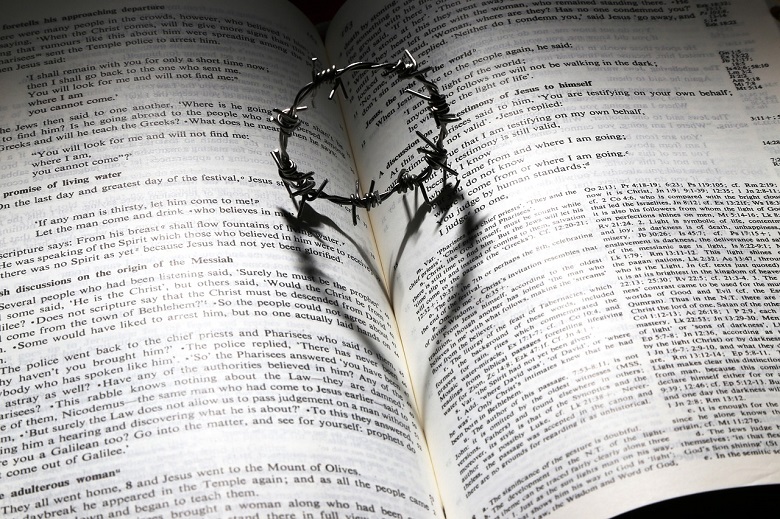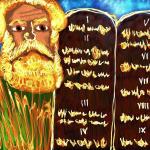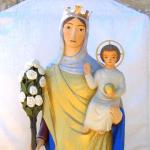
…and God said “Let there be a Bible and let it be perfect and let no one challenge anything in it.”
I’m not sure on which day out of six, YHWH made this decree but surely it was originally a part of the Genesis story. Surely.
Otherwise, why would some Christians believe that a book, written BY MEN and copied over and over BY MEN and translated over and over BY MEN could possibly be perfect and without challenge as the absolute word of YHWH?
Why is the Bible seen by some Christians as perfect and inviolate? As complete, faultless, flawless, undamaged, unmarred and containing the absolute word of God.
Is it possible for a book written by men to be a perfect representation of the mind of God?

One does not have to be a Biblical scholar to easily see that not a single one of those adjectives is accurate. Not one.
I could spend a lot of time and effort pointing out why the Bible is none of those things but scholars have done an outstanding job learning the actual facts and presenting them in an understandable manner. They have discovered unintentional errors, intentional “improvements” and outright forgeries.
It appears that the scribes who actually wrote the scrolls of the books of the Hebrew Bible compiled old stories from oral tradition and stories from cultures surrounding Israel and with great skill, wove them into a single narrative that tells the story of humanity from creation up to the time of the Babylonian captivity and beyond.
What scholarly work has been done to amplify our understanding of the Hebrew Bible?
Beginning in the nineteenth century, serious scholarship has been undertaken to attempt to reconcile what is “in the text” with what archaeologists have found “in the ground.”
Working with the findings of Wellhausen and others, Richard Friedman, together with other scholars like Joel Baden have shown, to the great aggravation of fundamentalists, how the Hebrew Bible was constructed mostly during and after the Babylonian captivity and not before.
Other scholars like Jacob Wright have developed theses regarding not the way in which the Hebrew Bible was constructed but why it was specifically written in the manner that it was.
Why was the Hebrew Bible written?
Traditionally, Judaism and Christianity teach that the Bible was inspired by YHWH, written by YHWH-guided hands, copied by YHWH-inspired hands and translated over and over and over and over again by YHWH-inspired hands. This is true in their interpretation of the Hebrew Bible as well as the New Testament.
What about the New Testament?
The New Testament (the Christian Bible) contains:
- 4 Canonical Gospels (Matthew, Mark, Luke, and John)
- the Acts of the Apostles
- 14 Epistles of Paul
- 7 General Epistles, and
- the Book of Revelation.
Scholars believe that the first New Testament books written were the epistles of Paul. The Gospels came later, followed by the remaining books, ending with the Book of Revelation. Of the Pauline epistles, scholars believe that seven were actually written by Paul (Saul in Hebrew):
- Galatians (c. 48 AD)
First Thessalonians (c. 49–51)
First Corinthians (c. 53–54)
Second Corinthians (c. 55–56)
Romans (c. 55–57)
Philippians (c. 57–59 or c. 62)
Philemon (c. 57–59 or c. 62)
For three, scholars are divided (about 50/50 as to authentic Pauline authorship:
- Second Thessalonians (c. 51–52)
Colossians (c. 57–59 or c. 62)
Ephesians (c. 62)
For the remaining epistles, scholars generally agree that they are pseudepigraphic, meaning that they were forgeries, not written by the author claimed.
- First Timothy (c. 72–74)
Second Timothy (c. 72–75)
Titus (c. 76–77)
The four canonical Gospels (Matthew, Mark, Luke, and John) were chosen for inclusion in the Bible and other Gospels were rejected. The book of Acts was written by the Luke author. The Book of Revelation was written by a man who calls himself John but cannot be identified with the other Johns in the New Testament. His precise identity is debated by scholars.
How was the New Testament compiled and canonized?
The New Testament as we know it, was compiled over a period of two or three centuries by bishops who met in councils at various times and places. In the final analysis the Bible we have today essentially contains the canon proposed by the Bishop of Alexandria, one Athanasius, in 367 CE. There were other viewpoints and some denominations of Christianity recognize other books, know collectively as the Apocrypha.
We come now, to the point where priests and preachers assert that the Bible is somehow perfect in its transmission of the mind of God.

Let us examine this belief and follow the process.
Let us place ourselves in the mind of a third century CE monk. Let us place that monk in a monastery in Ireland, off the west coast, in a place like Skellig Michael. We became a monk because we are the fourth son of a fairly well-off family in France. We are literate and we know French and we are learning Latin and Greek. Our family was not able to pass any inheritance to us. The oldest son inherits and we don’t like him so we run away and take vows.
The Church is preparing for a council during which the learned bishops will choose which books will be included in the BIBLE (which, at this time, while inspired by YHWH himself, does not yet exist).
How do we approach our work?
First of all, we are cold. The wind coming from the North Sea is cold and cuts through our wool habit like a knife. We might have a little fire in our cell but we don’t have a lot of fuel to feed it. We have had our meager mid-day meal of oatmeal and beer so we are still hungry and a little tipsy.
Our afternoon task is to copy a page from a scroll of the Book of the Prophet Ezekiel. We don’t feel especially good today. We are cold and hungry. We resent our place in the world. It is so unfair. Could this affect our diligence in copying a text in a language we barely understand? The bishop says we have to get this copy made today. He can punish us in unpleasant ways if we fail.
We might be extremely diligent to avoid punishment and we find a sentence in then text we are copying that doesn’t make sense. Simply changing one word will fix things and in our diligence, we make the change.
Onn the other hand, we might be resentful and angry and we might make dirty little notes in the margin. We might leave out that part that was hard to copy. We might make a change just to get back at the bishop. No one will know.
What does this mean?
Scholars have shown that all of these scenarios were present in the copying and translating the Bible which occurred over several centuries. These easily demonstrable facts make it impossible for a Bible, copied over and over (we have hundreds of manuscripts in the original languages (Hebrew and Koine Greek) and which have been shown to contain thousands of inconsistencies, and translated over and over again, to be “perfect” and “without error.” The idea is nothing short of ridiculous.
Of course, the Bible can be a source of profound wisdom and knowledge. It is our single most important document.
We can learn much about our history and about our culture. We can see the Bible as a guide to faith and practice.
But it is not and cannot be “the absolute word of God.” Period. It never claims to be perfect or anywhere in the text that its words are to be unchallenged. If it were, I have to believe it would say so.













